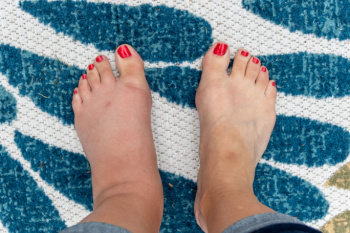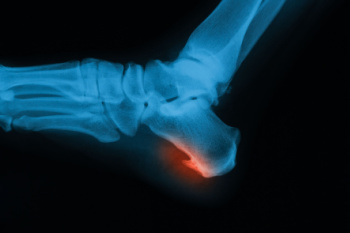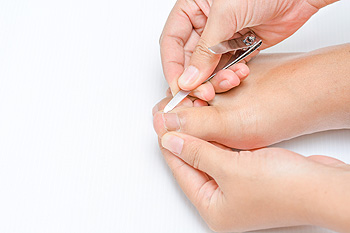May 2024
Plantar Warts Can Be Treated!
Uncommon Causes of Swollen Feet

Swollen feet can stem from various unexpected sources beyond the usual suspects like injury or fluid retention. One such cause of swelling, or edema, may be your footwear. Wearing ill-fitting shoes or high heels for prolonged periods of time can impede proper circulation, leading to swelling. A lesser-known cause could be dietary habits, particularly excessive salt intake, which can cause water retention in the body, resulting as swollen feet. Certain medications, such as antidepressants or blood pressure drugs, might also induce swollen feet as a side effect. In some cases, allergies to ingredients in skincare or cosmetic products can trigger inflammation, including in the feet. Additionally, long flights or car rides, where prolonged sitting limits movement, can result in swollen feet due to decreased blood circulation. If your feet have become swollen and remain so, it is suggested that you visit a podiatrist who can help you to manage this condition.
Swollen feet can be a sign of an underlying condition. If you have any concerns, contact one of our podiatrists of Bazzi Podiatry. Our doctors can provide the care you need to keep you pain-free and on your feet.
Swollen feet are a common ailment among pregnant women and people who stand or sit for extended periods. Aging may increase the possibility of swollen feet and patients who are obese often notice when their feet are swelling too. There may be medical reasons why swollen feet occur:
- Phlebitis - A condition that causes the veins to become inflamed and can also cause leg pain.
- Liver disease - This may lead to low blood levels of albumin which is a protein. This can cause fluid in the blood to pass into the tissues and several areas of the body can become swollen.
- Heart failure - When the heart doesn’t pump properly the blood that is normally pumped back to the heart can pool in the veins of the legs causing swollen feet.
- Kidney disease - One of the main functions of the kidneys is releasing excess fluid in the body. This type of condition can make it difficult for the kidneys to function properly, and as a result the feet may become swollen.
- Deep-vein thrombosis (DVT)- This is a serious condition where blood clots form in the veins of the legs. They can block the return of blood from the legs to the heart which may cause the feet to swell. It is important to be treated by a podiatrist if this condition is present.
Swollen feet can also be caused by bone and tendon conditions, including fractures, arthritis, and tendinitis. Additionally, there may be skin and toenail conditions and an infection may cause the feet to swell. Patients who take medicine to treat high blood pressure may be prone to getting swollen feet.
Many patients elevate their feet to help relieve the swelling and this is generally a temporary remedy. When a podiatrist is consulted the reason behind the swelling can be uncovered and subsequently treated.
If you have any questions please feel free to contact one of our offices located in Detroit, West Detroit, Northwest Detroit, Sterling Heights, Hamtramck, Dearborn Heights, Madison Heights, Redford, and Livonia, MI . We offer the newest diagnostic tools and technology to treat your foot and ankle needs.
Cuboid Syndrome is a Lesser-Known Foot Condition

Cuboid syndrome, though less common than other foot ailments, can cause significant discomfort and impairment in affected individuals. This condition occurs when the cuboid bone, located on the outer side of the foot, becomes displaced from its normal position within the foot's arch. The exact cause of cuboid syndrome is often attributed to overuse or repetitive stress, such as excessive running, jumping, or wearing poorly fitting shoes. Symptoms of cuboid syndrome typically include pain and tenderness along the outer edge of the foot, difficulty in walking or bearing weight, and limited range of motion in the ankle and midfoot. While cuboid syndrome is considered a rare injury, it is important to seek prompt medical attention if suspected, as delayed diagnosis and treatment can lead to prolonged discomfort and complications. Treatment options for cuboid syndrome may include rest, orthotics, and in severe cases, manipulation or mobilization techniques performed by a podiatrist to realign the cuboid bone and restore proper foot function. If you have pain in this part of your foot, it is suggested that you consult a podiatrist who can provide an accurate diagnosis and treatment.
Cuboid syndrome, also known as cuboid subluxation, occurs when the joints and ligaments near the cuboid bone in the foot become torn. If you have cuboid syndrome, consult with one of our podiatrists from Bazzi Podiatry. Our doctors will assess your condition and provide you with quality foot and ankle treatment.
Cuboid syndrome is a common cause of lateral foot pain, which is pain on the outside of the foot. The condition may happen suddenly due to an ankle sprain, or it may develop slowly overtime from repetitive tension through the bone and surrounding structures.
Causes
The most common causes of cuboid syndrome include:
- Injury – The most common cause of this ailment is an ankle sprain.
- Repetitive Strain – Tension placed through the peroneus longus muscle from repetitive activities such as jumping and running may cause excessive traction on the bone causing it to sublux.
- Altered Foot Biomechanics – Most people suffering from cuboid subluxation have flat feet.
Symptoms
A common symptom of cuboid syndrome is pain along the outside of the foot which can be felt in the ankle and toes. This pain may create walking difficulties and may cause those with the condition to walk with a limp.
Diagnosis
Diagnosis of cuboid syndrome is often difficult, and it is often misdiagnosed. X-rays, MRIs and CT scans often fail to properly show the cuboid subluxation. Although there isn’t a specific test used to diagnose cuboid syndrome, your podiatrist will usually check if pain is felt while pressing firmly on the cuboid bone of your foot.
Treatment
Just as the range of causes varies widely, so do treatments. Some more common treatments are ice therapy, rest, exercise, taping, and orthotics.
If you have any questions, please feel free to contact one of our offices located in Detroit, West Detroit, Northwest Detroit, Sterling Heights, Hamtramck, Dearborn Heights, Madison Heights, Redford, and Livonia, MI . We offer the newest diagnostic and treatment technologies for all your foot care needs.
Foot Problems and Quality of Life

Foot problems can have a profound impact on an individual's quality of life, affecting various aspects such as mobility, comfort, and overall well-being. Foot pathologies, including bunions, plantar fasciitis, and hammertoes, can cause chronic pain and discomfort, limiting one's ability to engage in daily activities and enjoy recreational pursuits. Moreover, these conditions often necessitate modifications in footwear choices, which can further restrict options and affect self-esteem. Foot alterations and deformities not only impair mobility but also have broader implications for general health and physical activity. Poor foot mechanics can lead to joint pain, muscle imbalances, and altered gait patterns, predisposing individuals to injuries and reducing participation in exercise and sports. Addressing foot problems through proper footwear, custom orthotics, and targeted interventions is essential for maintaining mobility, preserving independence, and improving overall quality of life. If you have foot problems, it is suggested that you seek help from a podiatrist who can diagnose and treat such issues, thereby helping you live a more active, fulfilling life.
Foot Pain
Foot pain can be extremely painful and debilitating. If you have a foot pain, consult with one of our podiatrists from Bazzi Podiatry. Our doctors will assess your condition and provide you with quality foot and ankle treatment.
Causes
Foot pain is a very broad condition that could be caused by one or more ailments. The most common include:
- Bunions
- Hammertoes
- Plantar Fasciitis
- Bone Spurs
- Corns
- Tarsal Tunnel Syndrome
- Ingrown Toenails
- Arthritis (such as Gout, Rheumatoid, and Osteoarthritis)
- Flat Feet
- Injury (from stress fractures, broken toe, foot, ankle, Achilles tendon ruptures, and sprains)
- And more
Diagnosis
To figure out the cause of foot pain, podiatrists utilize several different methods. This can range from simple visual inspections and sensation tests to X-rays and MRI scans. Prior medical history, family medical history, and any recent physical traumatic events will all be taken into consideration for a proper diagnosis.
Treatment
Treatment depends upon the cause of the foot pain. Whether it is resting, staying off the foot, or having surgery; podiatrists have a number of treatment options available for foot pain.
If you have any questions, please feel free to contact one of our offices located in Detroit, West Detroit, Northwest Detroit, Sterling Heights, Hamtramck, Dearborn Heights, Madison Heights, Redford, and Livonia, MI . We offer the newest diagnostic and treatment technologies for all your foot care needs.
Surgical Options for Ingrown Toenails
 For persistent or severe ingrown toenails that do not respond to conservative treatment, surgical options offer alternative solutions. One common procedure is a partial nail avulsion. In this procedure, a podiatrist, or foot doctor, removes the part of the nail that is digging into the skin. They may apply a chemical called phenol to the nail bed to prevent that portion of the nail from growing back, reducing the chance of recurrence. In recurrent cases, a total nail avulsion might be necessary, which involves the removal of the whole nail. These procedures are typically performed under local anesthesia in a podiatrist's office, allowing for quick recovery time and minimal disruption to daily activities. Surgical intervention not only resolves the pain and infection associated with an ingrown toenail but also helps prevent future issues, along with proper nail care and guidance from a podiatrist. If you are struggling with persistent ingrown toenails, it is suggested that you make an appointment with a podiatrist.
For persistent or severe ingrown toenails that do not respond to conservative treatment, surgical options offer alternative solutions. One common procedure is a partial nail avulsion. In this procedure, a podiatrist, or foot doctor, removes the part of the nail that is digging into the skin. They may apply a chemical called phenol to the nail bed to prevent that portion of the nail from growing back, reducing the chance of recurrence. In recurrent cases, a total nail avulsion might be necessary, which involves the removal of the whole nail. These procedures are typically performed under local anesthesia in a podiatrist's office, allowing for quick recovery time and minimal disruption to daily activities. Surgical intervention not only resolves the pain and infection associated with an ingrown toenail but also helps prevent future issues, along with proper nail care and guidance from a podiatrist. If you are struggling with persistent ingrown toenails, it is suggested that you make an appointment with a podiatrist.
Ingrown toenails can become painful if they are not treated properly. For more information about ingrown toenails, contact one of our podiatrists of Bazzi Podiatry. Our doctors can provide the care you need to keep you pain-free and on your feet.
Ingrown Toenails
Ingrown toenails occur when a toenail grows sideways into the bed of the nail, causing pain, swelling, and possibly infection.
Causes
- Bacterial infections
- Improper nail cutting such as cutting it too short or not straight across
- Trauma to the toe, such as stubbing, which causes the nail to grow back irregularly
- Ill-fitting shoes that bunch the toes too close together
- Genetic predisposition
Prevention
Because ingrown toenails are not something found outside of shoe-wearing cultures, going barefoot as often as possible will decrease the likeliness of developing ingrown toenails. Wearing proper fitting shoes and using proper cutting techniques will also help decrease your risk of developing ingrown toenails.
Treatment
Ingrown toenails are a very treatable foot condition. In minor cases, soaking the affected area in salt or antibacterial soaps will not only help with the ingrown nail itself, but also help prevent any infections from occurring. In more severe cases, surgery is an option. In either case, speaking to your podiatrist about this condition will help you get a better understanding of specific treatment options that are right for you.
If you have any questions please feel free to contact one of our offices located in Detroit, West Detroit, Northwest Detroit, Sterling Heights, Hamtramck, Dearborn Heights, Madison Heights, Redford, and Livonia, MI . We offer the newest diagnostic and treatment technologies for all your foot and ankle needs.






